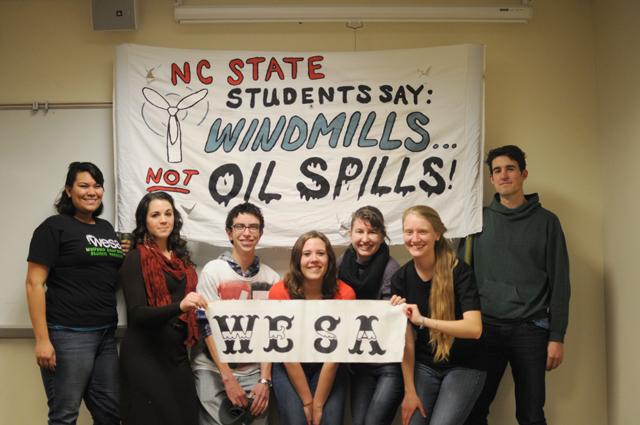A trashcan-sized replica of a wolf head made of wood and wrapped entirely in plastic bags sat in front of the Atrium Feb. 5.
The wolf head was fashioned and presented by Wolfpack Environmental Student Association as a part of its “Plastic Propaganda” campaign. Although the head has since been removed, the group has planned more “art activism” for the future.
Heather Troutman, WESA treasurer and senior in environmental sciences, is the founder and organizing manager of the Plastic Propaganda campaign created to “inform [N.C. State] about single-use plastic waste and minimize the amount of plastic used on campus.”
Less than 1 percent of plastic bags are recycled in the United States, according to Troutman.
The base structure of the wolf head was salvaged from the trash. A fraternity had constructed the head for a Homecoming float and thrown it away. The head was then stripped down and covered in plastic bags.
“Although it seemed like a lot of plastic bags, it was nothing compared to the number of plastic bags distributed in one day,” Troutman said. “The wolf head was just our first demonstration, and all of our demonstrations will be large scale and composed entirely of plastic.”
The next installment of the Plastic Propaganda campaign will target plastic bottle use.
“We’re currently working on full-scale vending machines made entirely out of plastic bottles to be placed semi-permanently all over campus,” Troutman said.
The replica vending machines will offer a wide variety of information like how many bottles are used per year, how much money could be saved in a year if a person used a reusable bottle, how much energy was used to create a bottle of soda and how far it is to the closest fountain soda machine.
The machines will be in place by March, Hannah Gotsch, WESA co-president and junior in chemical engineering, said.
Members of WESA encourage “conscious consumption” — awareness and conservative use of products like plastic bags and bottles — more than recycling.
“We don’t discourage recycling at all. [We encourage] a high sense of awareness,” Troutman said. “Recycling is not the best alternative. Consciousness is.”
WESA chooses art as a means of education to “invoke curiosity and expose people to new ideas.” And location matters, Gotsch said.
“There are so many people selling things in the Brickyard, and people just quit paying attention,” Gotsch said. “We’re hoping that by showing art and presenting [information] in a way where it pops out, it will catch people’s eye and make them more willing to get interested and actually stop and listen to us.”
Members of WESA said they believe raising awareness about plastic waste will challenge people to think of alternatives that fit easily into their lifestyles.
“Just imagine the kind of impact someone could make in just one year,” Troutman said.
WESA is working on a project which involves using recycled bottles from campus to make reusable bags and is trying to pass a University policy that will allow students to get a discount if they use their own bags. The idea mirrors the current bring-your-own-bottle policy at the Atrium, Gotsch said.
“Everywhere you go you see disposable plastic. It’s not that anyone is being blatantly unmindful. It’s just that we’re used to it,” Troutman said. “The statistics haven’t been promoted enough and there’s a lot of information that people don’t know.”
Another one of WESA’s projects is a “Green Guide” to the Triangle which will rate restaurants and eventually businesses on their sustainability. The guide should be available online within the next couple of months, Gotsch said.
WESA will be hosting its third annual alleycat – a city-style relay bike race – called “WESAcat.”
The race, which promotes alternative transportation, will take place on March 9 during spring break. Students can register to participate in the race or to work as a volunteer. The cost is $5 to preregister and $10 the day of the race.
With the money raised from WESAcat, the club hopes to work with WolfWheels to set up some bicycle repair shops on campus.








